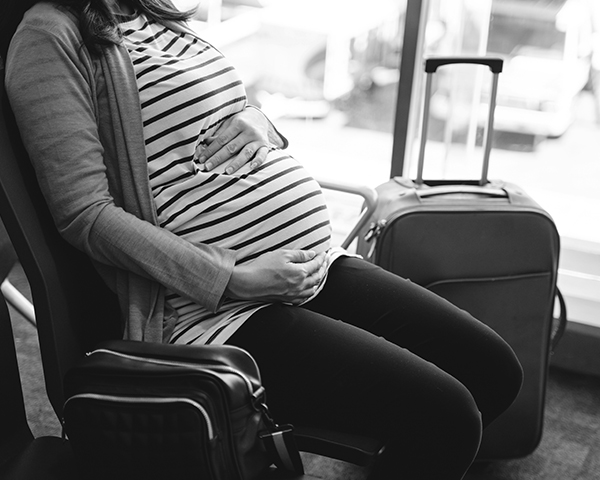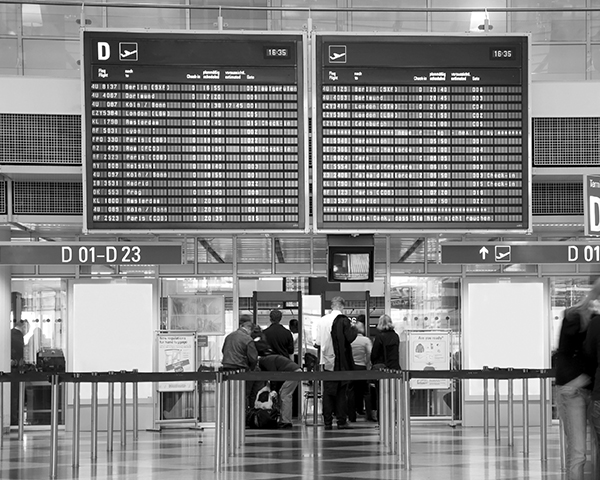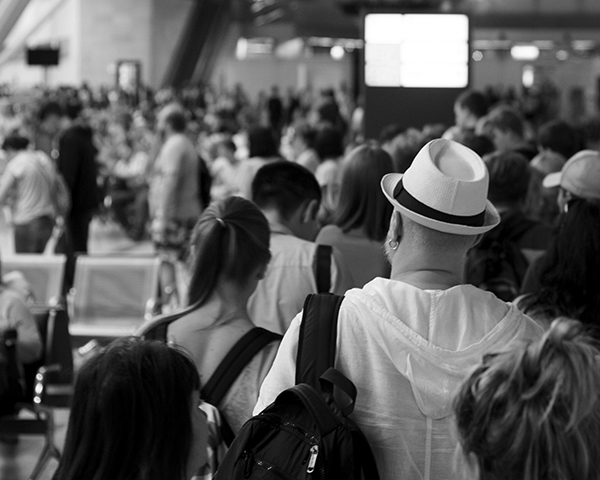Flying with a newborn baby, toddler or young children?
Flying with kids can be an exciting airborne adventure, especially if you’re flying with a baby or toddler for the first time.
We’ve all seen children standing in wonder looking at planes through the glass in the departure lounge. For kids it’s still magical. For parents, it might be more stressful. But it can still be fun.
The trick is to be prepared. Our guide is full of helpful hints and tips to check out before you check in.
When can you fly with a baby?
There aren’t any specific regulations or legal requirements around what age a baby must be to fly on a plane.
Some airlines will allow children to fly when they’re just two days old; others won’t let them fly until they’re at least two weeks.
According to the NHS, if you’ve given birth by caesarean section, you may not be allowed to fly until after your 6-week check-up.
Before you book your flights, check your airline’s policy on babies and small children.
Do babies fly free?
No, not always. Some airlines allow infants, defined as younger than 2 years old, to travel for free if they sit in their parent’s lap. Other airlines will charge an infant fee. This fee varies between airlines and could either be a flat fee or a percentage of the cost of an adult ticket.
Check each airline before you book to find which airline offers the best options for flying with a baby.
Can I bring my baby’s car seat?
It depends on the airline. There are reasons for and against taking your own baby or child’s car seat on a plane. And it will cost you more. If the airline allows car seats, you’ll have to book an extra seat instead of having your baby on your lap.
Some child car seats are TUV approved and will have a sticker that says ‘Certified For Use in Aircraft’. However, that does not guarantee you can take it on the airplane.
A car seat can be more comfortable for both you and your child. They will be more secure for take-off and landing, and more comfortable in the event of turbulence. Experts suggest not leaving a child, up to four weeks old, in a car seat for longer than 30 minutes . Keep that in mind if you do decide to use a car seat.
Each airline has specific guidelines on the width of their seats so you can check before you book if your car seat is compatible. Which? has a great guide on fitting your car seat on a plane and some more tips.
What can I take on a plane for my baby?
Luggage allowances vary from airline to airline. It’s a good idea to contact the company you’re flying with beforehand to find out exactly what you can take on the plane.
Typically, babies up to two years old, on your lap, can have a bag for their flight. A child over two, in their own seat, would be entitled to the same hand luggage allowance. Some airlines will also allow you to take a pushchair and car seat on board free of charge.
Baby food and baby milk
For UK airports, you’re allowed to travel with enough baby food, baby milk and sterilised water for the journey. You can also carry breast milk in hand luggage if you’re not travelling with a baby.
The maximum you can carry in each individual container is 2,000ml. Your containers will be screened and security staff may open containers to double check. The government provide helpful information, see table below:
| Item | Allowed in hand luggage | allowed in hold luggage |
|---|---|---|
| Breast milk | Yes, in containers up to 2,000ml | Yes |
|
Frozen breast milk |
No | Yes |
| Formula milk, cow’s milk | Yes (baby must be present) | Yes |
| Sterilised water for the baby | Yes (baby must be present) | Yes |
| Soya milk for babies | Yes (baby must be present) | Yes |
| Baby food | Yes (baby must be present) | Yes |
| Cooling gel packs | Yes | Yes |
Correct as at February 2023, for up to date information please check the link below.
Source: https://www.gov.uk/hand-luggage-restrictions/baby-food-and-baby-milk
What documents will my child need to fly?
Your child will need their own valid passport to fly outside the UK – no matter what age they are.
A child passport can be applied for online and costs £53.50 (current figure as at 02/2023), but it might cost more if you need the passport urgently. You can pay an extra £5 to get supporting documents sent back to you securely.
It should take around three weeks to get the passport. Bear in mind that it could take longer if you (or the person confirming your child’s identity) need to provide any additional supporting documents.
Children under the age of 16 do not need ID when flying within the UK. Parents can vouch for their child’s identity.
Hand luggage essentials
With children, it’s practically impossible to travel light. Think about how much weight you can carry, how many bags you can pack and work back from there. Try to travel smart and pack only what is essential, including:
- Nappies – one for each hour you’ll be travelling, plus extras for delays
- Baby food, expressed milk or formula, and boiled water in a baby bottle – unlike most liquids, these can be over 100ml
- A disposable changing mat, wet wipes and nappy sacks
- Blankets to help comfort your baby or keep them warm if the plane is cold
- Spare clothes for you and your baby in case there’s any sickness or spillages
- A favourite toy for comfort
- Dummies, bottles and teething toys to help ease ear pain
- Child medication such as ibuprofen or paracetamol
- Teething gel or powder
- Thermometer
Tips to stay happy and healthy
Okay, so the bags are packed and it’s almost time for the flight. To make sure your child is as happy and comfortable as possible, there’s a few extra considerations:
Nerves
Before leaving for your trip, speak to your child about how exciting the journey is going to be. If they’re nervous, for any reason, talk them through what will happen, from arriving at airport to getting to your destination. Make it sound like the adventure that it is.
Most airlines will share a seating map before boarding so if you can, show them where you’ll be sitting on the plane beforehand. You can also show them how to fasten a seatbelt and explain what will happen during take-off and landing.
Airline staff are great, they will help you deal with any unexpected nerves and hopefully put a smile back on their face.
Motion sickness
You know it. It’s a fact of travel. Many children between the ages of three and 12 experience motion sickness. There are several treatments that could help, including wristbands, tablets and diluting salts.
The NHS has some helpful tips:
- Look straight ahead at a fixed point
- Close your eyes and breathe slowly while focusing on breathing
- Distract your kids by talking, listening to music or singing songs
- Try ginger in the form of a tablet, biscuit or tea
Dehydration
It can become extremely dry within the plane cabin due to low humidity. This can cause children to get dehydrated quicker than usual, so keep lots of bottled water and fruit to hand.
Ear pressure
Babies, toddlers and young children can all experience ear pain during a flight, particularly during take-off or landing.
Young children don’t always understand how to yawn or swallow to reduce pain, so you might want to try these ideas instead:
- Make sure your child has plenty of liquids to drink (especially if they have a cold as dehydration can make the symptoms worse)
- Show older children how to hold and blow their nose to reduce pressure
- If older, they can suck on boiled sweets to help reduce the pressure
Keeping your child entertained
This is a tricky one. The good thing? There’s plenty of tricks to keep them entertained whether it’s their first flight or they’re a regular flyer.
Teach them about the destination
Learning new things is a huge part of travelling. And educating your kids on where you’re going can be fun. Here’s some tips on how to teach them about where you’re going, what to expect, the culture and language:
- Get your children exploring before they arrive at their destination by teaching them all about different countries, cities and cultures
- Teach your children the basics of the local language. They’ll love the smiles and reactions they receive when they say ‘ciao’, ‘adios’ or ‘merci’
- Teach them about local foods – and encourage them to try something completely different
Music and books
- Load your phone or MP3 player with your child’s favourite songs
- Take their favourite books in print or eBooks
Electronic apps
Even if you don’t like your child using technology, there’s no denying that apps, tablets and games can be a great distraction when travelling.
Make sure you download their favourite TV show episodes, films and games so that everything can be accessed offline.
On-board entertainment
Some flights, particularly long-haul, will have screens or devices with hundreds of cartoons, TV shows, movies and games to choose from.
That will keep them entertained for 10 minutes or so.
Other helpful travel guides
Looking for more useful information? Check out some of our other guides to help you relax when you’re traveling abroad.

Travelling while pregnant
If your baby’s on the way, here are some key things to consider

Delayed flights
Could you be entitled to compensation if your flight is delayed?

Flight disruption
Unsure whether you’re entitled to flight delay compensation? Find out what you can do
Consider other passengers
Awkward. Yes, it can be. In reality, when the person sitting next to you sees you approach with a baby. A roll of the eyes or a tut. It’s not helpful, or polite. But it happens. There’s lots of heart-warming stories of how parents handle this, from hand-written notes, to small gifts, to explanations as to why their child may behave a certain way. It’s honest, it’s open and it might make the flight a little more comfortable for all of you.
Keep your family covered
Now that you’re fully prepared for your flight; the next step is to make sure you’ve got the right travel insurance in place.
Sainsbury’s Bank Travel Insurance will give you the peace of mind to enjoy a stress-free, relaxing break. Well, as much as you can relax with the kids in tow.
Underwritten by Great Lakes Insurance UK Limited.
Any questions?
Check out our most frequently asked questions about travel insurance. If you still need to talk to us, our friendly team will be happy to help.
Call 0345 305 2621
Sales and service lines are open 9am-5pm Monday to Friday. Closed weekend and Bank Holidays. Calls may be monitored or recorded. Calls are charged at local rates from landlines and mobiles.
Terms and conditions
* Up to 20% discount applies when you tell us your Nectar card number. Discount does not apply to premiums for pre-existing medical conditions or enhanced gadget cover. You won't be eligible if you buy through a price comparison website. We reserve the right to change or cancel this offer without notice.
This guide aims to be informative and engaging. Though it may include tips and information, it does not constitute advice and should not be used as a basis for any decision, financial or otherwise. Sainsbury's Bank accepts no responsibility for the opinions and views of external contributors and the content of external websites included within this guide. All information correct at date of publication 25 June 2020
Sainsbury’s Bank Travel Insurance is underwritten by Great Lakes Insurance UK Limited. Great Lakes Insurance UK Limited is a company incorporated in England and Wales with company number 13436330 and whose registered office address is 10 Fenchurch Avenue, London, United Kingdom, EC3M 5BN. Great Lakes Insurance UK Limited is authorised by the Prudential Regulation Authority and regulated by the Financial Conduct Authority and the Prudential Regulation Authority. Firm Reference Number 955859. You can check this on the Financial Services Register by visiting; register.fca.org.uk.
Sainsbury’s Bank Travel Insurance is sold and administered by Hood Travel Limited, registered at Companies House 08318836. Hood Travel is authorised and regulated by the Financial Conduct Authority under registration number 597211. Hood Travel Limited’s registered address is at 52/54 Alexandra Street, Southend-on-Sea, Essex, SS1 1BJ. Hood Travel is an insurance intermediary providing a non-advised service. We act for and on behalf of the insurer.
